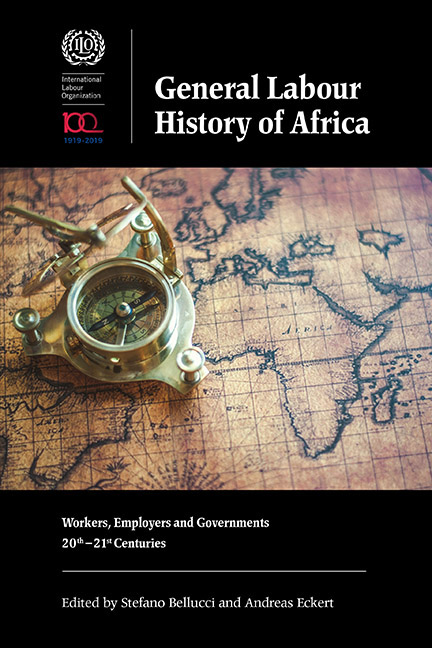Book contents
- Frontmatter
- Contents
- List of Maps and Figures
- List of Tables
- Notes on Contributors
- Foreword
- Acknowledgements
- The ‘Labour Question’ in Africanist Historiography
- Part I Free and Unfree Labour
- Part II Key Sectors
- Part III International Dimensions and Mobility
- Part IV Varieties of Work
- Part V Entrepreneurs and Self-Employment
- 15 Capitalists and Labour in Africa
- 16 Entrepreneurial Labour
- 17 Professionals and Executives
- Part VI The State, Unions and Welfare
- Part VII Conclusions
- Select Bibliography
- Index
17 - Professionals and Executives
from Part V - Entrepreneurs and Self-Employment
Published online by Cambridge University Press: 21 September 2019
- Frontmatter
- Contents
- List of Maps and Figures
- List of Tables
- Notes on Contributors
- Foreword
- Acknowledgements
- The ‘Labour Question’ in Africanist Historiography
- Part I Free and Unfree Labour
- Part II Key Sectors
- Part III International Dimensions and Mobility
- Part IV Varieties of Work
- Part V Entrepreneurs and Self-Employment
- 15 Capitalists and Labour in Africa
- 16 Entrepreneurial Labour
- 17 Professionals and Executives
- Part VI The State, Unions and Welfare
- Part VII Conclusions
- Select Bibliography
- Index
Summary
Over the course of the twentieth century there have been radical changes to the working lives and employment opportunities of millions of Africans. This is true of waged labour as well as entrepreneurs, self-employed artisans or what might be deemed professionals. The development and growth of professional occupations, such as lawyers, doctors and nurses, have had major impacts on the social and political history of the continent. At the same time, however, these developments have been highly contested and uneven across the continent, and they open interesting questions about middle-class aspirations and how these connect with wider dynamics.
Professionals – those educated, trained and practising in a specific occupation – have always been a minority in the working and economically active populations in Africa, especially considering that most labour in Africa has historically been found in the agricultural, manufacturing and mining sectors. However, educated and professionally trained Africans have had a significant impact on the political shifts on the continent from the nineteenth century to the present. African doctors, lawyers and academics, in particular, were often key protagonists in opposing colonialism. The educated elite were also foundational members of the nationalist and liberation movements that emerged across the continent and, after that, in the governance and politics of the postcolonial era.
This political dimension of African professionals has been well documented. In Egypt, professionals, students and entrepreneurs joined together to protest against British enforced economic reforms in 1919, while in Tunisia and Algeria new professionals confronted the pro-settler stance of the French after 1907.2 In Ghana, lawyers were crucial in the early elite-led nationalist movement. As for Southern Rhodesia (Zimbabwe), the two most prominent nationalists, Robert Mugabe and Joshua Nkomo, were both teachers who had studied outside the country. In South Africa, Nelson Mandela was a trained and practising lawyer. Doctors and physicians had the education and social advantages that enabled them to be ‘accepted in elite circles and be taken seriously as political candidates’. For example, Dr Félix Houphouët-Boigny became the first president of Côte d'Ivoire, and Miltion Margai became the first prime minister of Sierra Leone. In southern Africa, influential figures such as Dr Hastings Kamuzu Banda, Samora Machel and Dr Agostinho Neto were all trained physicians turned politicians.
- Type
- Chapter
- Information
- General Labour History of AfricaWorkers, Employers and Governments, 20th-21st Centuries, pp. 475 - 492Publisher: Boydell & BrewerPrint publication year: 2019



